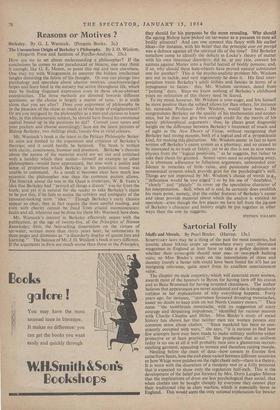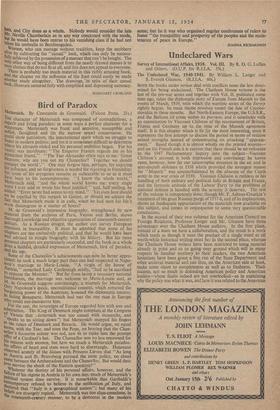Sartorial Folly
Muffs and Morals. By Pearl Binder. (Harrap. 15s.) SUMPTUARY laws may be a thing of the past for most countries, but trouble about bikinis crops up somewhere every year; illustrated magazines in -England at least have to take a policy decision on whether their cover-girls should wear one- or two-piect bathing suits; so Miss Binder's study on the interrelation of dress and decency (surely a better title could have been found for it?) has an intriguing relevance, quite apart from its excellent entertainment value.
The chapter on male coquetry,- which will entertain most women, awards most of the honours to Byron for having torn off his cravat and to Beau Brummell for having invented cleanliness. The author believes that appearances are never accidental and she is imaginatively ruthless in her explanations of why everything happens. Forty years ago, for instance, "sportsmen favoured drooping moustaches, easier no doubt to keep trim on wet North Country moors." Then came "the toothbrush moustache, with its suggestion of crazy courage and despairing impudence," identified for various reasons with Charlie Chaplin and Hitler. Miss Binder's study of social history has shown her that neither men nor women possess any common sense about clothes. "Since mankind has been so con- sistently occupied with wars," she says, "it is curious to find how few attempts have ever been made to make military uniforms either protective or at least practical." She prophesies that as uniform today is no use at all it will probably turn into a glamorous recruit- catching garment, appealing to women and therefore raising morale.
Nestling below the mass of data—how corsets in Europe first came from Spain, how the cod-piece varied between different countries or how Whigs wore patches on the right cheek only—there is a theory. It is worn with the discretion of a modesty vest or a frilly petticoat that is expected to show only the regulation half-inch. This is the development of the belief put forward by Mrs. Doris Langley-Moore that the implications of dress are less psychological than social; that when clothes can be bought cheaply by everyone they cannot play their traditional role in class warfare, which is especially fierce in England. This would seem the only rational explanation for bowler
hats, and City dress as a whole. Nobody would consider the late Mr. Neville Chamberlain as in any way concerned with the mode, but he would have been untrue to his vanishing class if he had not taken his umbrella to Berchtesgaden.
Women, who can manage without tradition, keep the snobbery alive by cultivating the "casual" look, which can only be success- fully achieved by the possession of a manner that can't be bought. The Only other way of being different from the neatly dressed masses is to Wear clothes that do not fit at all, and this does not appeal to everyone. There is probably too much material in this richly amusing book, and the chapter on the influence of the East could easily be made another study altogether. The drawings,' in spite of their casual look, illustrate sartorial folly with simplified and depressing accuracy.
MARGARET CROSLAND



































 Previous page
Previous page